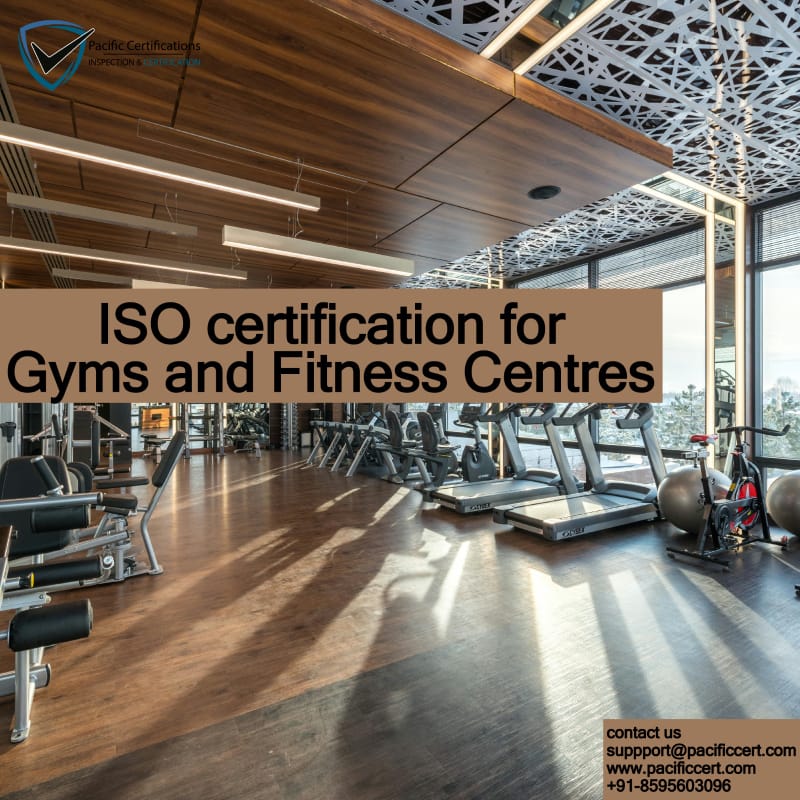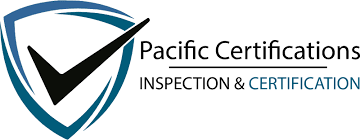ISO Certifications for Gyms & Fitness Centers, Requirements and Benefits

Introduction
The fitness and wellness industry has evolved into a global phenomenon, with gyms and fitness centers becoming central to modern lifestyles. From boutique studios to large fitness chains, the industry faces increasing expectations for safety, hygiene, service quality, and data protection.
According to IBISWorld, the global health and fitness club market is projected to surpass USD 140 billion by 2030, driven by post-pandemic wellness awareness, digital memberships, and sustainable fitness operations.
Adopting ISO certifications helps gyms and fitness centers establish internationally recognized systems for quality management, safety compliance, environmental care, and information security ensuring consistency, customer trust, and long-term growth.
Strong bodies are built on discipline, strong businesses are built on systems. ISO certification gives fitness centers both — Pacific Certifications
Quick Summary
ISO certifications such as ISO 9001, ISO 45001, ISO 14001, ISO/IEC 27001, and ISO 50001 help gyms ensure safety, cleanliness, and service excellence. They strengthen management systems, improve customer satisfaction, reduce operational risks, and enhance brand reputation in the wellness market.
Applicable ISO Standards for Gyms and Fitness Centers
There are several ISO standards that are relevant and beneficial for gyms and fitness centers, below are the common ones:
ISO 9001: Quality Management Systems (QMS)
ISO 9001 is the international standard for quality management systems (QMS). It helps gyms and fitness centers to ensure they meet customer and other stakeholder needs within statutory and regulatory requirements.
ISO 14001: Environmental Management Systems
This standard provides a framework for effective environmental management systems. Implementing ISO 14001 can help gyms and fitness centers reduce their environmental impact, comply with regulations, and improve environmental performance.
ISO 45001: Occupational Health and Safety Management Systems
ISO 45001 is designed to help organizations improve employee safety, reduce workplace risks, and create better, safer working conditions.
ISO 27001: Information Security Management Systems (ISMS)
Given the increasing reliance on digital systems for membership management, personal training sessions, and client data storage, ISO 27001 is crucial for ensuring the confidentiality, integrity, and availability of information in gyms and fitness centers.
Click here to find out more applicable standards to your industry
What are the requirements of ISO Certifications for Gyms and Fitness Centers?
ISO certifications for gyms and fitness centers involve a comprehensive process that ensures these organizations meet international standards for quality and safety among other aspects. Below are the requirements of the most applicable ISO standards:
General requirements:
Policy & Objectives: Develop clear quality, safety, and hygiene policies aligned with ISO standards.
Risk Assessment: Identify risks related to member safety, data breaches, or facility equipment failures.
Health & Safety Controls: Maintain emergency exits, fire safety, and first aid facilities per ISO 45001.
Equipment Maintenance: Schedule routine inspection and servicing of fitness machines and tools.
Staff Training & Competence: Train staff in CPR, hygiene standards, equipment use, and customer service.
Customer Feedback & Complaint Handling: Implement structured systems for member feedback and resolution.
Cleaning & Sanitation Protocols: Document and enforce cleaning procedures for gym areas and locker rooms.
Information Security Management: Protect membership data, digital access systems, and online platforms per ISO/IEC 27001.
Environmental Management: Control energy use, water consumption, and waste disposal per ISO 14001.
Internal Audits: Conduct periodic audits to verify system performance and compliance.
Management Review: Review safety, performance, and customer satisfaction data regularly.
Regulatory Compliance: Ensure adherence to local health, safety, and data protection laws.
Continuous Improvement: Use member feedback and audit findings to enhance processes and services.
Specific requirements:
ISO 9001 (Quality Management) Requirements
Understanding the needs and expectations of fitness members and consistently delivering services that meet those expectations.
Establishing a leadership structure that supports quality standards and encourages a culture of improvement.
Identifying risks associated with service delivery and implementing measures to reduce or eliminate them.
Standardizing processes to ensure that services, such as personal training or facility maintenance, are consistently delivered to high standards.
Regularly monitoring performance metrics, such as customer feedback and facility cleanliness, to identify areas for improvement.
Implementing mechanisms for ongoing improvement in service quality, based on data and feedback.
ISO 14001 (Environmental Management) Requirements
Developing and implementing an environmental policy that reflects the gym’s commitment to sustainability and resource efficiency.
Identifying the environmental aspects of the gym's operations, such as energy usage, waste management, and water consumption.
Ensuring that the fitness center complies with all applicable environmental laws and regulations.
Implementing measures to reduce resource consumption, such as energy-efficient lighting, water-saving practices, and waste recycling.
Continuously monitoring environmental performance and setting measurable objectives for improvement.
Ensuring that staff are aware of the gym’s environmental goals and are trained to operate in a way that minimizes environmental impact.
ISO 45001 (Occupational Health and Safety) Requirements
Identifying potential health and safety hazards within the gym, including risks related to gym equipment, facilities, and emergency situations.
Ensuring that the gym complies with all local and international health and safety laws and regulations.
Developing and implementing a robust health and safety policy that prioritizes the well-being of employees and gym members.
Establishing procedures for reporting accidents, incidents, and near-misses, as well as measures for responding to them effectively.
Providing regular training to staff on health and safety protocols, including emergency response and safe equipment handling.
Regularly reviewing and improving health and safety measures to reduce workplace hazards and ensure a safer environment for both employees and gym-goers.
Tip: Begin with ISO 9001 and ISO 45001 to build a solid foundation for quality and safety, then integrate ISO 14001 and ISO 27001 for sustainability and secure member data management.
What are the benefits of ISO Certifications for Gyms & Fitness Centers?
Standardizing the processes improves the quality and efficiency of services. Below are the key benefits:
Safety: ISO 45001 minimizes health risks and accidents for staff and members.
Service Quality: ISO 9001 ensures consistent member experience, from onboarding to facility maintenance.
Hygiene & Cleanliness Assurance: ISO 14001 supports cleaner, sustainable, and eco-friendly gym environments.
Data Privacy & Security: ISO/IEC 27001 protects customer information and digital platforms.
Energy & Cost Efficiency: ISO 50001 reduces energy use from lighting, HVAC, and machines.
Member Trust: Certification demonstrates professionalism and regulatory compliance.
Regulatory Alignment: Meets safety and hygiene laws, especially important for franchises and fitness chains.
Consistency: Standardized processes reduce downtime, complaints, and maintenance errors.
Market Advantage: ISO-certified gyms attract health-conscious members and corporate wellness contracts.
Brand Reputation: Certification builds credibility with investors, partners, and members alike.
The fitness industry is shifting toward technology-driven and sustainable operations. Statista (2025) projects that digital and hybrid gyms will account for over 45% of global memberships by 2030.
ISO-certified gyms adopting ISO 9001 and 45001 report 35% fewer customer complaints and 40% fewer workplace incidents. Additionally, ISO 14001 and 50001 are becoming key tools in achieving carbon-neutral facility operations.
In the coming decade, data privacy and cybersecurity will play a major role as fitness centers rely on mobile apps, wearables, and AI-based health analytics—making ISO/IEC 27001 a competitive necessity.
How Pacific Certifications Can Help?
Pacific Certifications, accredited by ABIS, provides independent audit and certification services for gyms, fitness chains, and wellness centers.
Pacific Certifications can help by:
Conducting audits for ISO 9001, 45001, 14001, 27001, and 50001.
Issuing accredited ISO certificates accepted by local regulators and global partners.
Supporting integrated management system audits for multi-location fitness chains.
Contact Us
If you need support with ISO certification for your Gym and Fitness Center, please contact us at [email protected] or +91-8595603096.
Read more: Pacific Blogs

